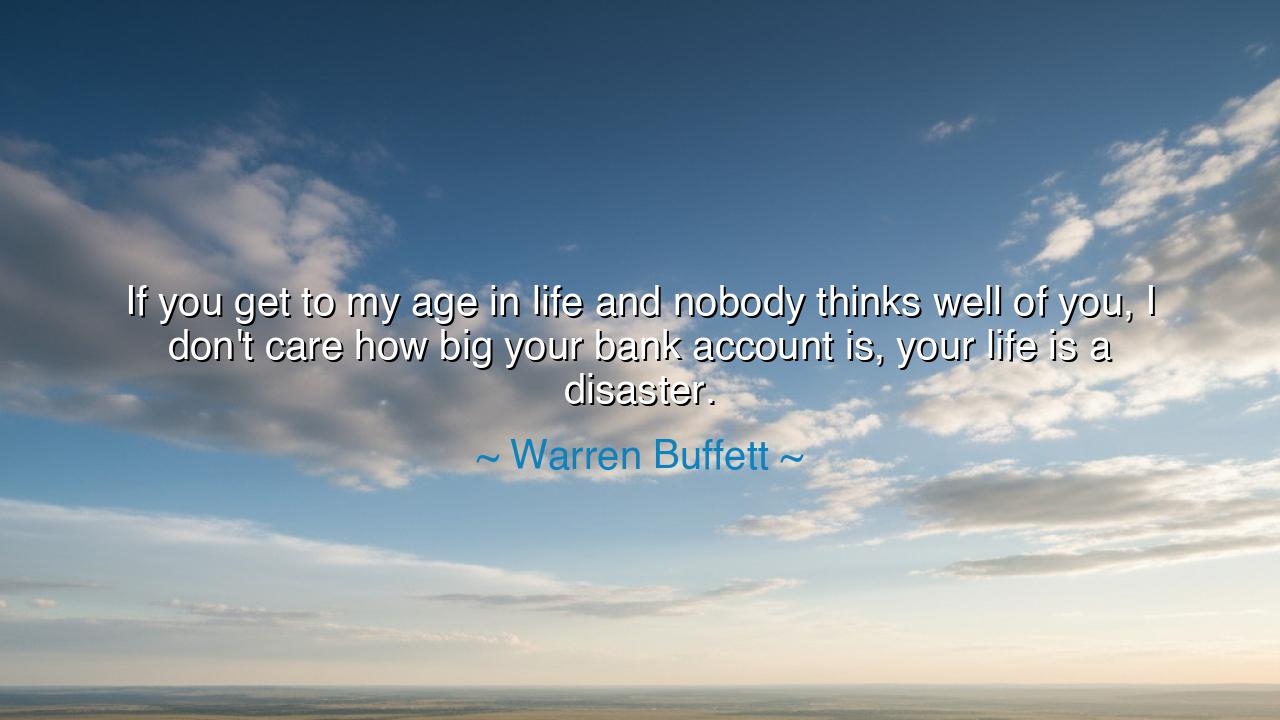
If you get to my age in life and nobody thinks well of you, I
If you get to my age in life and nobody thinks well of you, I don't care how big your bank account is, your life is a disaster.






"If you get to my age in life and nobody thinks well of you, I don't care how big your bank account is, your life is a disaster." — Warren Buffett
In these words, Warren Buffett imparts a lesson that transcends the fleeting concerns of wealth and material success. He reminds us that the true value of a life is not measured by the size of one's bank account or the accumulation of material goods but by the relationships we build, the integrity we maintain, and the respect we earn. In essence, Buffett declares that character is the most important asset one can have, for if you live a life that leaves no positive impression on others, then all the wealth in the world cannot redeem your soul. The wealth of human connection and the respect of those around us are the true treasures that should guide our actions.
This wisdom echoes the teachings of the ancients, who placed great emphasis on the moral character of a person over the material wealth they accumulated. The Greek philosophers, such as Socrates, Plato, and Aristotle, believed that a life of virtue, honesty, and integrity was far more valuable than one spent in the pursuit of wealth. Socrates famously said, "An unexamined life is not worth living," a statement that called upon individuals to live lives filled with purpose and moral reflection, rather than chasing after riches that could not bring true happiness.
Consider the life of Cato the Younger, a Roman statesman and Stoic philosopher who lived his life with an unwavering commitment to integrity. Cato, though born into the upper echelons of Roman society, did not measure his life by wealth or political power but by the virtue of his character. His reputation was his wealth, and he valued his honor and reputation above all else. When he died, it was not the size of his fortune that people remembered, but the purity of his moral convictions, the way he stood for what was right, even when it cost him personally. Cato’s life serves as a powerful reminder that true success comes not from wealth, but from the way we live and treat others.
Buffett’s statement also speaks to the universal truth that external accomplishments and material possessions are fleeting and temporary. King Croesus of Lydia, once one of the wealthiest men in the ancient world, is often cited as an example of how riches do not guarantee happiness or respect. Despite his immense fortune, he was ultimately dethroned and forced to live in exile, with little regard for his former glory. The real tragedy of Croesus' life was not his fall from wealth, but the fact that his wealth had never been enough to earn him true respect from those around him. Buffett warns us against the illusion that wealth will shield us from the true tests of character and reputation.
In the modern world, this lesson can often be lost in the frenzy of competition and success. We live in a time when status and wealth seem to define a person’s worth. Yet, Buffett challenges this notion by reminding us that at the end of our days, it is not the bank account that will matter, but the love and respect of those around us. If we have lived our lives in such a way that we are valued and honored by our community, our legacy will be one of true worth. But if we have built our success on greed, deception, or selfishness, then no amount of money can save us from the emptiness of our lives.
Buffett’s words call us to reflect on the deeper purpose of our lives. We must ask ourselves, “What will people remember when I am gone? What kind of impact have I had on those around me? Have I lived a life of integrity, honesty, and kindness?” These are the questions that define the quality of our lives, not the number of zeroes in our bank accounts. To lead a life that others think well of is to live with purpose, to make decisions that align with our highest values, and to be guided not by the pursuit of wealth but by the pursuit of meaning.
The practical lesson here is to prioritize character over material success. While it is important to work hard and be successful in our careers and personal endeavors, we must never lose sight of the fact that our reputation, the respect of our peers, and the legacy we leave are the true measures of a life well-lived. To cultivate this, we must practice honesty, be kind to others, and act with integrity in every aspect of our lives. By doing so, we ensure that, no matter what the world might say about our bank accounts, we will be remembered for the good we did, the people we helped, and the principles we upheld.
Thus, let us take Warren Buffett’s words to heart: to live a life that others respect, to build a legacy not of material wealth but of moral character and genuine impact. The wealth of reputation is the greatest treasure one can attain, and it is this that will sustain us, not only in the eyes of others but in our own hearts as well. Let us invest in the qualities that cannot be bought—honor, integrity, and love—and in doing so, ensure that our lives are a true success, no matter what the world may measure.






AAdministratorAdministrator
Welcome, honored guests. Please leave a comment, we will respond soon